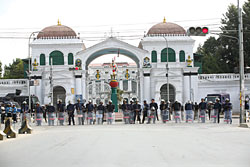 KIRAN PANDAY |
But since the Maoists quit the government in May our rush towards change has come to a complete halt. The largest party hasn't stopped sulking about civilian supremacy. Mistrust between political parties has so deepened that no high-level task force or fence-mending meet has come up with a solution. This has been going on for over seven months and there's no end in sight to this deadlock.
Very few things have actually changed in Nepal in the last year. The country is still reeling from a crippling fuel crisis, and Nepalis are quietly getting ready for long, dark, cold winter nights. Nepal bandas have continued, new businesses are too scared to invest and the continuing extortion of entrepreneurs has led some to consider closing shop. While those who killed journalists Birendra Sah and Uma Singh have gone scot-free more journalists are being threatened and beat up all over Nepal. The rehabilitation of ex-combatants is in limbo. Three years on from the CPA, the families of the victims of war have no word on missing family members, nor official acknowledgement of wrongdoing by either side or reparations.
The Nepali people are not a priority for the leadership because the latter are so bogged down by political bickering. Then there are the big meetings to attend, from Kala Patthar to Copenhagen. These are important global meets, but they are easy distractions and an excuse not to deal with what is really important at home. Most of the mammoth 57-member government delegation in Copenhagen for the climate conference are CA members. Shouldn't their priority be writing the constitution that is due in six months?
Nepalis knew the transition would not be easy and it would be difficult to bring different ideologies together. But we also knew that no matter what our beliefs we all wanted the same thing - peace and development. Political parties will always disagree, but this time around they agreed to come together and write the constitution. If the constitution is not written on time, and it is looking more and more likely that it won't be, there will be anarchy in Nepal. We will be an embarrassment in the world community and the leaders will have once again failed the people.
A recent survey indicates the majority of Nepalis either don't know what federalism is, or don't want it. Perhaps if the leaders had left Kathmandu to talk to their constituencies we would not now be stumbling towards a system that most Nepalis do not even want. The priority should be fixing Nepal first. In order to do that Nepal's leadership must let go of rigid ideological stances that the common people do not care about. Being flexible does not equate to being weak. People want promises delivered. They want results. They are tired of the limbo. They want great change. They want the leadership to put them first.



